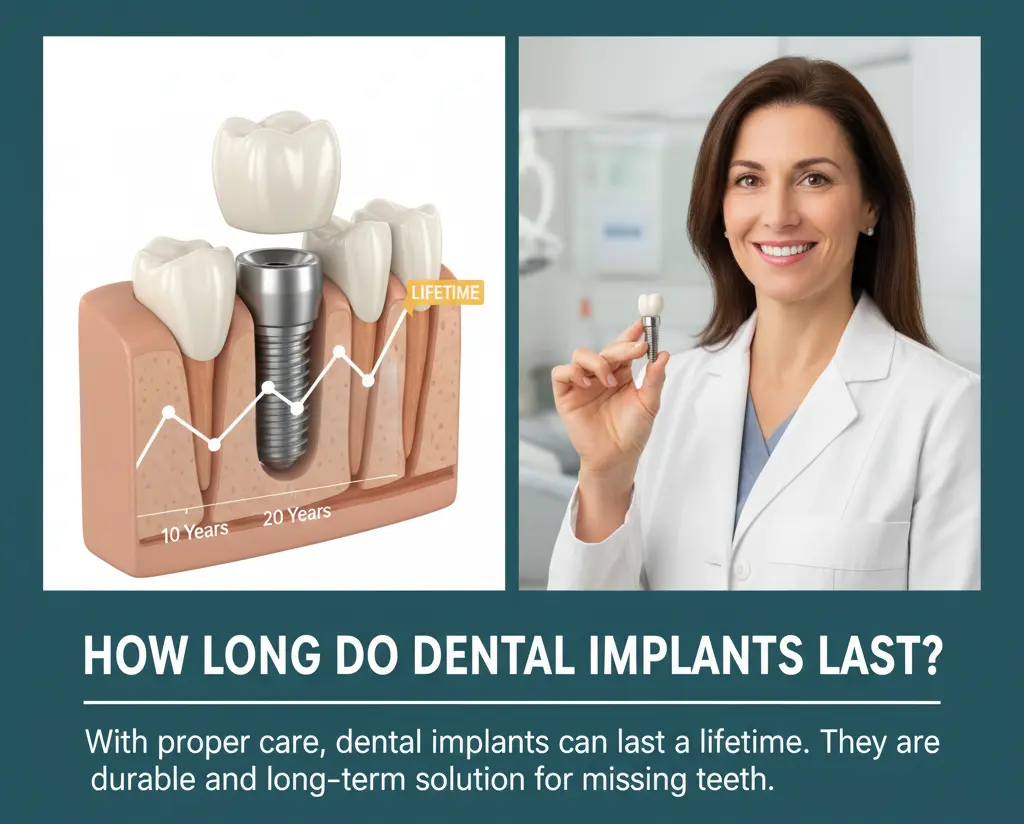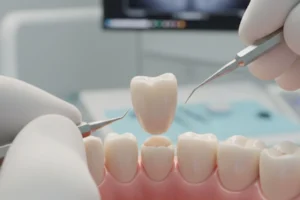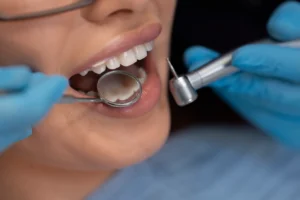How Long Do Dental Implants Last?

How Long Do Dental Implants Last?
When it comes to replacing missing teeth, dental implants are one of the most trusted and long-lasting solutions available today. Patients often ask: How long do dental implants last? The answer isn’t always straightforward, as it depends on factors such as oral hygiene, lifestyle, and the skill of the dentist performing the procedure. In this article, we’ll explore how durable implants really are, what influences their lifespan, and how you can maximize their longevity.
What Are Dental Implants?
Dental implants are small titanium or zirconia posts that act as artificial tooth roots. They are surgically placed into the jawbone, where they fuse naturally through a process called osseointegration. Once healed, a crown, bridge, or denture is attached to the implant, creating a stable and natural-looking replacement tooth. Unlike traditional dentures or bridges, implants are designed to mimic both the function and appearance of natural teeth.
Average Lifespan of Dental Implants
With proper care, dental implants can last 20 years or more—and many last a lifetime. Studies show that the success rate of implants is over 95%, making them one of the most reliable dental treatments available.
While the implant post itself can last a lifetime, the dental crown placed on top typically lasts 10–15 years before it may need replacement due to wear and tear. Advances in dental materials, however, mean that today’s crowns are stronger and more resistant than ever.
Factors That Affect How Long Implants Last
1. Oral Hygiene Habits
Brushing twice daily, flossing, and regular dental check-ups are critical. Poor oral hygiene can lead to gum disease, which weakens the tissues supporting implants.
2. Lifestyle Choices
Smoking and excessive alcohol use can slow healing and increase the risk of implant failure. Patients who avoid these habits generally enjoy better long-term results.
3. Bone Health
Implants rely on strong bone for stability. Conditions like osteoporosis or bone loss from untreated gum disease can reduce implant lifespan.
4. Bite and Grinding
Patients who grind their teeth at night (bruxism) may put excess pressure on implants, leading to complications. Wearing a night guard can protect your investment.
5. Quality of the Procedure
The expertise of the dentist and the technology used play a big role. Clinics like Smile Lounge use advanced digital imaging and guided implant placement, which improves accuracy and outcomes.
Benefits of Long-Lasting Implants
- Natural Look & Feel: Implants blend seamlessly with your smile.
- Durability: With proper care, they can last a lifetime.
- Bone Preservation: They prevent jawbone shrinkage after tooth loss.
- Confidence Boost: No slipping dentures or speech issues.
- Cost-Effective: While the upfront cost is higher, implants save money in the long run by avoiding replacements.
How to Make Your Dental Implants Last Longer
- Brush with a soft-bristled toothbrush twice a day.
- Floss or use interdental brushes around implants daily.
- Schedule professional cleanings every 6 months.
- Wear a night guard if you grind your teeth.
- Maintain a healthy diet low in sugar and processed foods.
- Quit smoking to reduce the risk of implant failure.
By following these steps, you can extend the lifespan of your dental implants and protect your overall oral health.
Common Myths About Dental Implants
Myth 1: Implants don’t last long.
Truth: When cared for properly, they can last a lifetime.
Myth 2: Implants are painful.
Truth: The procedure is done under anesthesia, and most patients report minimal discomfort.
Myth 3: Implants require special cleaning.
Truth: They should be cleaned just like natural teeth with brushing and flossing.
Who Is a Good Candidate?
Most healthy adults with missing teeth can benefit from dental implants. However, patients should have:
- Sufficient jawbone density
- Healthy gums free of active periodontal disease
- Good general health for safe healing
Your dentist will evaluate your oral condition with X-rays or 3D scans before recommending treatment.
Frequently Asked Questions (FAQs)
1. Do dental implants ever fail?
Yes, though rare. Implant failure can happen if the bone doesn’t integrate properly, or if gum disease develops. The risk is higher for smokers or patients with uncontrolled diabetes.
2. Can implants be replaced if they fail?
In most cases, yes. After proper healing and bone restoration, a new implant can be placed.
3. Are implants better than bridges?
Yes, because they don’t rely on adjacent teeth for support. Bridges require grinding down healthy teeth, while implants preserve natural tooth structure.
4. How much do dental implants cost?
The cost varies depending on the number of implants, type of restoration, and the clinic. While they are more expensive than dentures, their durability makes them a worthwhile investment.
5. Is there an age limit for implants?
No strict limit exists. Many seniors successfully receive implants, provided their bone and overall health are adequate.
Final Thoughts
Dental implants are one of the most durable and reliable tooth replacement options in modern dentistry. With a high success rate, natural aesthetics, and the potential to last a lifetime, they’re an excellent investment in your oral health and quality of life.
At Smile Lounge, our team is committed to providing personalized implant solutions that last for years to come. By maintaining good oral hygiene, attending regular check-ups, and making healthy lifestyle choices, you can ensure your dental implants stay strong and functional for decades.










